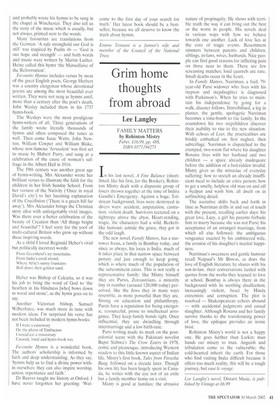Grim home thoughts from abroad
Lee Langley
FAMILY MATTERS by Rohinton Mistry Faber, £16.99. pp. 488, ISBN 0571194273 In his last novel, A Fine Balance (shortlisted, like his first, for the Booker), Rohinton Mistry dealt with a disparate group of losers thrown together at the time of Indira Gandhi's Emergency. Against a huge, Tolstoyan background, lives were destroyed in divers ways: accident, amputation, castration, violent death. Survivors teetered on a tightrope above the abyss. Heart-rending, tragic, the characters had a wild. Beckettlike humour; astride the grave, they got in the odd laugh.
The new novel, Family Matters, has a narrower focus, a family in Bombay today, and since as always, his locus is India, much of it takes place in that narrow space between penury and just enough to keep going, which is where much of the population of the subcontinent exists. This is not really a representative family: like Mistry himself they are Parsis, Zoroastrians, a minority tiny in number (around 120,000 today) perceived, like the Jews they in many ways resemble, as more powerful than they are. Strong on education and philanthropy, Parsis have a reputation for being energetic, resourceful, prone to intellectual arrogance. They keep family bonds tight. Once influential, they are dwindling through intermarriage and a low birth-rate.
Parsi writing made its mark on the postcolonial scene with the Pakistani novelist Bapsi Sidhwa's The Crow Eaters in 1978, comic and picaresque, introducing Western readers to this little-known aspect of Indian life. Mistry's first book, Tales from Firozsha Baag, followed on a decade later. Though his own life has been largely spent in Canada, he writes with the eye not of an exile but a family member home on a visit.
Misty is good at families; the abrasive
nature of propinquity. He shows with terrible truth the way it can bring out the best or the worst in people. His novels deal in various ways with how we behave towards one another. Lack of love lies at the core of tragic events. Resentment simmers between parents and children, siblings, in-laws, wives, husbands. Nice people can find good reasons for inflicting pain on those near to them. There are few screaming matches: loud quarrels are rare. Small deaths occur in the heart.
In Family Matters, Narriman, a frail, 79year-old Parsi widower who lives with his stepson and stepdaughter is diagnosed with Parkinson's. When he tries to maintain his independence by going for a walk, disaster follows. Immobilised, a leg in plaster, the gentle, apologetic Narriman becomes a time-bomb to the family. In the countdown his two stepchildren discover their inability to rise to the new situation. With echoes of Lear, the practicalities are briskly embarked on: first neglect, then subterfuge. Narriman is dispatched to the cramped, two-room flat where his daughter Roxana lives with her husband and two children — a space already inadequate before the addition of a bed-ridden invalid. Mistry gives us the minutiae of everyday suffering: how to stretch an already insufficient meal to include an extra person; how to get a smelly, helpless old man on and off a bedpan and wash him, all dwelt on in unflinching detail.
The narrative shifts back and forth in time as Narriman drifts in and out of touch with the present, recalling earlier days: his great love, Lucy, a girl his parents forbade him to marry because she was not Parsi; his acceptance of an arranged marriage, from which all else followed: the ambiguous vengeance exacted by his embittered wife, the erosion of his daughter's marital happiness.
Narriman's sweetness and gentle humour recall Naipaul's Mr Biswas, as does the love of English literature he shares with his son-in-law, their conversations larded with quotes from the works they learned to love at school. Bombay is always there in the background with its seething disaffection: increasingly violent, beset by Hindu extremists and corruption. The plot is resolved — Shakespearean echoes abound — with accidental judgments and casual slaughter. Although Roxana and her family survive thanks to the transforming power of love, the epilogue provides an ironic twist.
Rohinton Mistry's world is not a happy one. He goes further than Larkin: man hands out misery to man. Anguish and tribulation come to the vulnerable; the cold-hearted inherit the earth. For those who find visiting India difficult because it offers too much reality, this will be a tough journey, but taut le voyage.
Lee Langley's novel, Distant Music, is published by Vintage at £6.99


































































 Previous page
Previous page